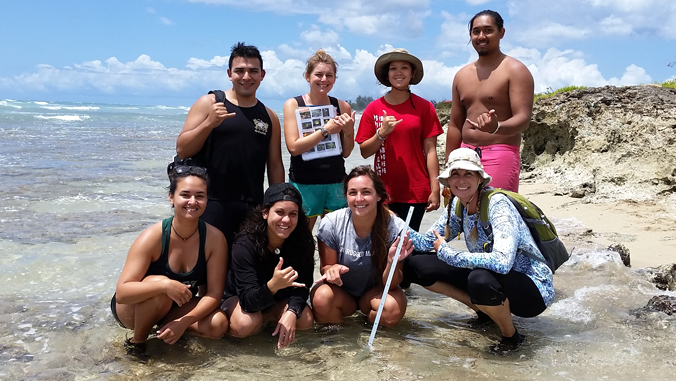
Joanna Philippoff, assistant specialist at the University of Hawaiʻi at Mānoa’s College of Education, was awarded $44,000 from the UH Sea Grant College Program for professional development for middle and high school science teachers and internships for students. As part of the two-year grant project, Philippoff and co-directors Heather Spalding of UH Mānoa’s botany department and Craig Nelson of the oceanography department will receive funding for Our Project in Hawaiʻi’s Intertidal (OPIHI).
“The Hawaiian intertidal is a culturally important, but understudied, ecosystem composed of a community of organisms uniquely adapted for the challenging living conditions that come from being alternatively submerged and exposed,” Philippoff explained.
The OPIHI project includes two components—a teacher professional development program and an undergraduate internship program. The professional development program trains teachers and K–12 students across the Hawaiian Islands how to survey the intertidal and collect citizen science data. In the year-long internship program, groups of undergraduate students are immersed in and mentored through the scientific research process. Their research projects have included investigating trampling in the intertidal, tracking algae biomass shifts over time and mapping benthic community composition with respect to submarine groundwater discharge.
With the College of Education Curriculum Research and Development Group since 2010, Philippoff has been working with teachers, K–12 students, undergraduates and scientific collaborators to characterize the Hawaiian rocky intertidal to determine if and how the community is changing over time. To date, 30 undergraduate interns, 57 teachers and approximately 1,500 middle and high school students have participated in OPIHI.
“This award will allow my colleagues and me to train two cohorts of 15 undergraduate students each in ecological tools and techniques and to work with scientific collaborators and facilitators to design and carry out rigorous research projects that further our knowledge of Hawaiʻi’s intertidal and coastal ecosystems,” Philippoff said.
OPIHI has made significant contributions to science, education and the community. Participants have shown improvement in content knowledge, have honed their critical and investigative skills and increased awareness of ecological and conservation issues.

